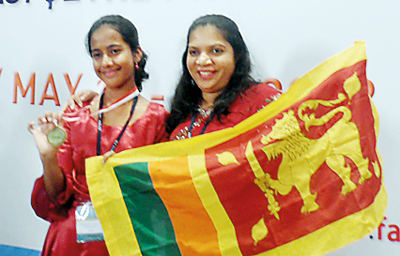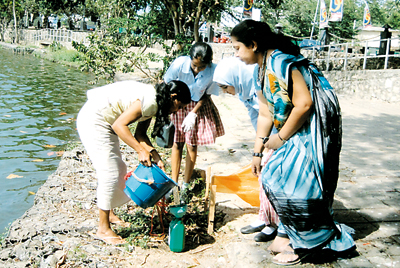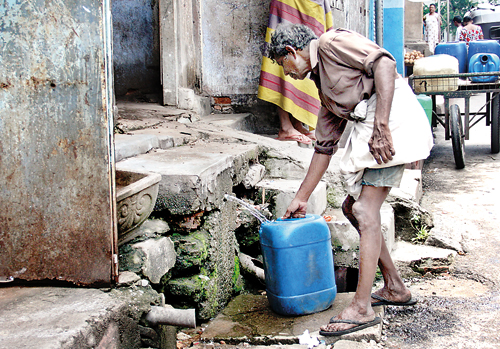Teacher-pupil duo makes waves
It was a guru-gola (teacher-student) effort that led to Sri Lanka gaining prominence at an international Environmental Olympiad held recently.
With 125 environmental projects being selected from 50 countries for the 20th International Environment Project Olympiad held in Turkey, Istanbul, it was a proud moment for Sri Lanka when the teacher-student duo from Learnium International School, Etul Kotte, was able to win the bronze medal.

A proud moment for Shenali (left) and Shamalee
The research project supervised by Vice Principal and Chemistry teacher A.M.U. Shamalee and student Shenali Lokubalasuriya is of importance because it deals with the removal of heavy metal ions in water using natural and eco-friendly materials available in Sri Lanka, the Sunday Times understands.
Currently not only the presence but also the effects of heavy metals are part of a major national study being conducted by the health authorities in collaboration with the World Health Organisation to zero-in on the cause of Chronic Kidney Disease of unknown aetiology (CKDu) that is felling the farmer of the North Central Province.
It was while high-level researchers are attempting to shed light on the scourge of CKDu, that Shamalee and Shenali went about their task of carrying out experiments on the removal of heavy metals from water.
“Heavy metals such as cadmium, copper, mercury, lead and zinc are natural components of the earth’s crust. As trace elements some heavy metals such as copper, selenium and zinc are essential to maintain the metabolism of the human body. But higher concentrations can lead to poisoning,” points out Shamalee, explaining that heavy metals can enter the water supply through industrial waste.
Referring to the conventional methods of removal of heavy metals from waste water, she reiterates that it is often cost-prohibitive. One of the cost-effective alternative technologies for the removal of such metals to acceptable levels has been found to be through biomaterials.
This is why this teacher and student decided to test the usability of natural, eco-friendly and commonly available materials in the country in the removal of heavy metal ions in industrial waste.Detailing the experiments, Shamlee says that 10 water samples were obtained from different places close to factories and industries in Colombo where industrial waste water gets collected.

Collecting water samples during the project
Earlier, they had tested the absorptive qualities of four natural materials – coconut coir, rice husk, clay bricks and gotu kola (Centella asiatica) plants – using water samples with trace amounts of lead, copper and cadmium.
Distilled water samples had been used as a control. While the experiments were conducted in the school laboratory, the water samples had been analysed using the Flame Atomic Absorption Spectroscopy (AAS) at the Colombo University’s Department of Chemistry. The conclusions were that coconut coir and rice husk are “excellent materials” for the absorption of heavy metals in industrial waste water, says Shamalee, explaining that another finding was that gotu kola, not only a medicinal plant but also quite popular as a sambol, absorbs heavy metals.
Can heavy metals in gotu kola found in areas which have industrial waste water, accumulate and pass on to people when they eat it? Could it be harmful? How can coconut coir and rice husk be utilised practically in ridding industrial waste water of heavy metals?
These are the answers that Shamalee and her students will look for in the near future.
Follow @timesonlinelk
comments powered by Disqus
























